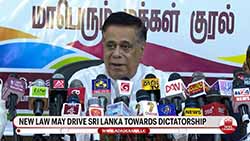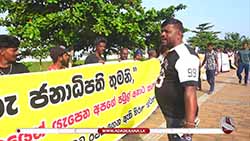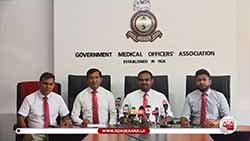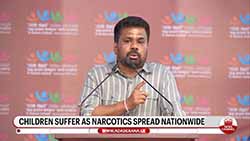Political delays in development projects led to Sri Lanka’s financial crisis: Namal says in India
April 8, 2025 02:59 pm
Sri Lanka Podujana Peramuna (SLPP) Member of Parliament Namal Rajapaksa says that politically driven delays in development projects in Sri Lanka resulted in an energy crisis that ultimately led to the country’s worst financial crisis.
Speaking during a special address themed “The South Asian Platter: Menu for Growth” at the ‘Rising Bharat’ Summit held in India today (April 8), Rajapaksa stressed that development efforts must be carried out without delay, highlighting the importance of acting when the moment demands it.
“We must implement and execute what has to be done at that given time.”
“What we saw in the past couple of years—because we purely ignored certain development projects based on political reasons—for example, Sampur was supposed to be started in 2015, and similarly many other projects were delayed like Uma Oya from the Iranian funding—and as a result, in 2022 we faced an energy crisis that later turned into a financial crisis”, MP Rajapaksa stressed.
Commenting on the impact of US trade tariffs to the South Asian region, Namal Rajapaksa urged South Asian nations to move beyond political divisions and pursue regional cooperation to tackle shared development challenges.
Highlighting the urgency of regional partnerships, Rajapaksa emphasized the potential of South-South collaboration, especially among Indian Ocean nations, stating, “This is the time that the region should get together, and Indian Ocean countries have to get together and build new partnerships on trade.”
“…What has happen in Washington will not only affect directly to Sri Lankan apparel or the exports—but also the maritime industry in Sri Lanka. You know, we are heavily depending on trade and logistics as well at the same time”, Rajapaksa added.
The parliamentarian also underlined the importance of strengthening ties with regional powers. “This is something we need to work together with countries like India, to see how we can work new alliances and build new partnerships within the region,” he added.
When asked about the challenges of advocating reform while being linked to a prominent political family, Rajapaksa acknowledged the complexities, and expressed, “It’s how you project yourself and how you face it, because it’s going to be always challenging. Politics is not an easy profession to be in. The circumstances change. As politicians and as political parties, we should reform around it.”
“It will be challenging, but it’s all about how we face it and understanding the global context as well—because politics is no more conceited on your own constitution or only to your own country”, he added.












